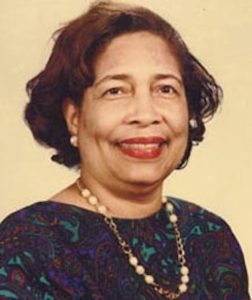
Etta Z. Falconer
*This date celebrates the birth of Etta Falconer, a Black mathematician and educator, in 1933.
From Tupelo, Mississippi, Etta Zuber (her birth name) was the second of two children (an older sister, Alice) of Dr. Walter A. Zuber, a physician, and Mrs. Zadie L. Montgomery Zuber, a Spelman College musician. Young Zuber attended public schools in Tupelo, graduating from George Washington High School in 1949. She attended Fisk University and was a student under Lee Lorch. She graduated Summa Sum Laude with a mathematics major and a chemistry minor in 1953. A Phi Beta Kappa, she attended the University of Wisconsin at Madison, earning an MS in Mathematics (1954).
Zuber began teaching a year later at Okolona Junior College in Okolona, Mississippi, until 1963. While there, she met and married Dolan Falconer. After a few years, she entered Emory University in Atlanta. In 1969, she became the 10th Black woman to earn a Ph.D. in Mathematics (from Emory University) with an Algebra dissertation entitled: "Quasi group Identities Invariant under Isotopy." Dr. Falconer was Assistant Professor of Mathematics at Spelman College (1965-71), Assistant Professor of Mathematics at Norfolk State College (1971-72), and Chair and Associate Professor of the Department of Mathematics at Spelman College).
Falconer earned a Master's Degree in Computer Science from Atlanta University (1982); attended the University of Illinois-Champagne-Urbana during the summers of 1962-1965 and during the 1964-65 academic year at a National Science Foundation (NSF) Teacher Training Institute; and she attended the University of California-Santa Barbara (summer of 1980) - a workshop on "The Integration of Micro-Computers into the Undergraduate Mathematics Curriculum." In 1995, Falconer was awarded the AWM Louise Hay Award to celebrate outstanding mathematics education achievements.
After being awarded the Hay award, Falconer said, "I have devoted my entire life to increasing the number of highly qualified African Americans in mathematics and mathematics-related careers. High expectations, building self-confidence, and the creation of a nurturing environment have been essential components for the success of these students. They have fully justified my beliefs. Perhaps the most rewarding moments have come when younger faculty have undertaken the same goal and have surpassed my efforts reaching out to the broader community to help minorities and women achieve in mathematics." In 1999, the Council of the American Association elected Falconer for the Advancement of Science as a fellow of the AAAS.
In 2001, Falconer won the AAAS Lifetime Mentor Award and Dr. James H.M.N. Henderson from Tuskegee. In 2002, the American Association for the Advancement of Science presented Dr. Falconer with its Mentor Award for Lifetime Achievement. She died on September 18, 2002.